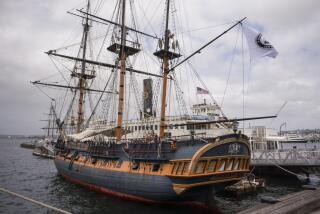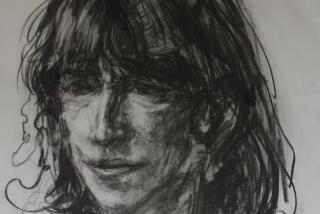Slow Boat to Yorktown : THE FIRST SALUTE <i> by Barbara W. Tuchman (A Borzoi Book/Alfred A. Knopf: $22.95; 384 pp., illustrated; 0-394-55333-0) </i>
- Share via
In James Peale’s “The Generals at Yorktown,” the painting’s right side presents traditional portraits of George Washington and his victorious allies. But covering the entire left half is a brooding seascape of the French ships, some afloat, others sunk below the water, that made America’s success possible.
Most historians of that climatic battle have concentrated on Peale’s human figures. Now in “The First Salute,” Barbara Tuchman corrects the balance with an account of the long passage that brought those ships to Washington’s salvation in Chesapeake Bay.
Although her book is half the size of “Stillwell and the American Experience,” Tuchman has crammed it with the anecdotes and deft characterizations that have distinguished her work for more than 30 years. Her title comes from the cannon salute given an American ship, the Andrew Doria, as it entered the Dutch harbor of St. Eustatius in the West Indies on Nov. 16, 1776. Tuchman points out that the occasion was the first time another country formally acknowledged a vessel from the newly independent United States.
But that salute is merely her hook to involve us in the story she really wants to tell. Some years ago, Tuchman set out her rules for writing a successful volume of history, and she began: “ . . . first catch your reader.” Assured that she has us firmly on the line, she now begins with a leisurely review of Dutch shipping from the 16th Century.
Three years ago, Tuchman was invited to the Netherlands to join in commemorating the 40th anniversary of the Dutch liberation from the Nazis. Long before that, however, her study of Dutch history had stimulated and inspired her. Nothing in the book, not even the American triumph at Yorktown, matches her awe as she tells of the way the Dutch built dikes, pumps and ditches in order to make live-able land out of “the wave-flooded, water-soaked edge of Europe.”
Tuchman respects courage, possibly above all other virtues, and in the creation of Holland, she can also celebrate ingenuity and vision. She says, “The amazing growth and expansion of Holland was a phenomenon that causes historians to stutter. . . . It may be a mystery only in the sense that extreme exertions possible to the human spirit can never be wholly elucidated.”
For the first third of Tuchman’s book, it’s entertaining, if a little puzzling, to be viewing the American Revolution through the prism of Dutch shipping. Then she shifts our attention to Sir George Rodney, the British admiral who avenged Holland’s salute to America by seizing and occupying St. Eustatius early in 1781. Tuchman has reservations about Rodney--particularly for expelling a small colony of Jews from St. Eustatius with only one day’s notice--but his fearlessness and dark good looks captivate her, and her portrait of him is as memorable in its way as the one by Joshua Reynolds.
Because Tuchman writes with such verve and apparent pleasure, readers will probably notice, but not complain, that they are now two-thirds of the way through her book and she has said almost nothing about its ostensible topic, the American Revolution. In the past, she has chided English writers for grinding out yet another biography of such stale subjects as Oliver Cromwell and Queen Victoria, and that may be why she pays George Washington only token obeisance and quotes sparingly from John Adams’ diaries. Otherwise, as in most of her earlier work, it is Europe that holds her imagination in thrall.
And why expect anything different from the author of the magnificent opening chapter of “The Guns of August” with its celebration of the spectacle of King Edward VII’s funeral in 1910? At the time of the Cuban Missile Crisis, her artful storytelling in that book was vivid enough to President John Kennedy that he quoted it to his brother Robert and vowed that he would not let America and Russia blunder into war as Europe had done in 1914.
Then, Tuchman was asked to write an account of President Kennedy’s own funeral, and she has acknowledged that she “took a rather cool view,” which “was a disappointment to readers who wanted the grand tone.” Although Tuchman is philosophically a Democrat, her nature is aristocratic, and she admits to finding more drama in a dilemma facing a major political figure than “in the lives of little people, in pale Laura and her glass menagerie, in the death of a salesman, in loneliness crying for little Sheba to come back.”
When in “The First Salute” we come at last to America and the battle of Yorktown, we learn that Adm. Rodney will not be joining us there. The chapters about him turn out to have been something of a digression, since Rodney has sailed to England for surgery to correct a painful prostate condition. Britain’s prosecution of the war is left to Gen. Henry Clinton in New York and Adm. Thomas Graves outside Chesapeake Bay.
The challenge of Yorktown seems to bring a new energy to “The First Salute,” as it did to the Continental Army. Tuchman has expressed her belief that history should be written “by the ounce” rather than served up in gallon jugs by historians more dedicated to establishing an event’s meaning and purpose rather than simply relating what happened. When she heeds her own advice in this book, her writing is stirring:
“At 10 o’clock on the morning of Oct. 17 (1781), a faint tattoo of drums, barely making itself heard over the pounding of the guns, was located coming from a small red-coated drummer boy standing on the parapet of the Hornwork. The taller figure of an officer waving a handkerchief in lieu of a white flag emerged from the Hornwork and walked toward the American lines with the drummer boy along side, still furiously beating his drum. Upon this apparition, now both audible and visible, Allied guns ceased their fire.”
Tuchman has also warned fellow historians not to try to impose themselves on their material. But in “The First Salute,” she often ignores that excellent injunction and allows herself a far greater number of homilies and moral lessons than in her earlier work:
--”The appetite for power is old and irrepressible in humankind, and in its action almost always destructive.”
--”It is a peculiar habit of Christianity to conceive the most compassionate and forgiving divinities and use them to sponsor atrocity.”
--”People rarely take seriously reports of their own decline, and Britain’s war leaders were no different from the normal run.”
If this is not history by the gallon, it may be history by the half-pint, and Tuchman needn’t have paused for those asides. Her research has already made the same points.
What, then, has Tuchman given us in “The First Salute?” Rather than any attempt at reviewing the American Revolution, she has provided a highly individual account of European sea power. Edmund Wilson once said that he considered that his success as a writer lay in having written the books he wanted to write rather than those his publishers wanted from him. Tuchman could make the same claim, and she could add that millions of readers have endorsed her choices gratefully.
Compared with her flagships and frigates, “The First Salute” may be only a schooner. But consider the armada that over the last three decades Tuchman has launched.
More to Read
Sign up for our Book Club newsletter
Get the latest news, events and more from the Los Angeles Times Book Club, and help us get L.A. reading and talking.
You may occasionally receive promotional content from the Los Angeles Times.










